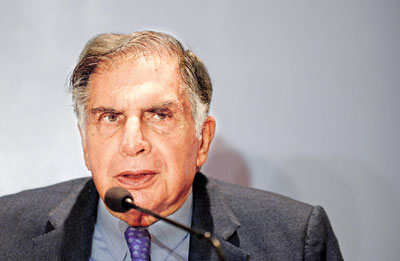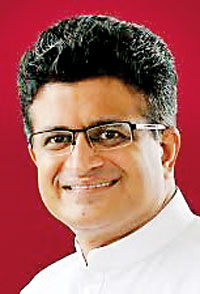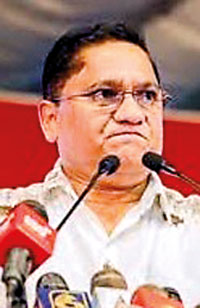Columns
‘Ratan Tata wasn’t a mere tycoon: He embodied the very soul of India’
View(s):- How the Tata dynasty spent their wealth in the service of India
Rattan Tata was not born with a silver key that would grant him automatic entry to the Tata kingdom nor with a direct claim to the Tata bloodline.
However, when he died last week in Mumbai at the age of 86, he was not only the Tata Group’s emeritus chairman but celebrated as the business tycoon who turned Tata’s 5 billion dollar turnover into 100 billion dollars by transforming the Indian conglomerate into a global powerhouse all within a 21-year tenure in the chairman’s office.
Yet the one quality the billionaire was admired for the most, was his simple humility, which manifested in the genuine concern he expressed to his fellow beings and the way he directly touched their hearts.
Humility had probably begun for him in his father Naval’s household. Naval had lost his father at the age of four; and bereft of the family breadwinner, his mother faced a hard time bringing up three sons on the scarce income she earned from her embroidery work.
Tata founder Jamshetji Tata’s second son, N.D. Tata, who was childless, suddenly died at the age of 47. His elder and only brother Sir Dorabji Tata, who was himself childless, held a family meeting where it was decided that, since a son was needed to perform the Uthamna rites—the Parsi last rites for the dead—it had become necessary to adopt one. They did not have to search far.
Sir N.D. Tata’s wife Navajbai had already taken a fondness to Naval. Furthermore, Naval’s mother was a maternal cousin of the Tata brothers. Naval fitted the Tata mould.
At the age of 13, the clouds that had eclipsed his star, suddenly cleared to shine with divine force to pick him from an orphanage gutter and ensconce him in luxury’s lap at the heart of the Tata mansion. It wasn’t winning the sweepstakes but the lottery of life. Fortune had blessed the teenager with her most dazzling smile.

FIFTH TATA GROUP CHAIRMAN, ‘TITAN’ RATAN TATA’: A man who, in the midst of enormous wealth, shone with his radiant humility unto the end
Despite his newfound affluence, the formative childhood years of adversity never left him throughout his life for his sudden rise from poverty’s pit to the ranks of enormous wealth served only to humble him more.
For him, humility was not a condescending garb he wore but one that naturally stemmed from deep within his heart. He said, “I am grateful to God for giving me an opportunity to experience the pangs of poverty which more than anything else moulded my character in later years of my life.”
It also came naturally to his own son, Ratan Tata who, in the midst of untold wealth, inherited and valued the same down-to-earth qualities for which he was admired the most by the people who had met him.
But it wasn’t all love and charity for Ratan as he made his slow climb from the foothills of the family mount to reach its elusive elysian peak, reserved for the heroes immortalised by gods. Armed with a degree in architecture from Cornell University in the United States, he returned to India and plunged into the family business.
Like his father had done before him, he worked his way up from the lowest rung in the Tata empire to scale its heights and ascend its peak. As he strove step by step the spurring steel of ambition to make Tata the market leader or nearest rival in any field or industry in which the company had a controlling stake, drove him without relent. To be third rate wasn’t an option but an insult, a sacrilege to the hallowed Tata image and name.
The hailed Tata ethos of shunning unscrupulous business practices and never paying bribes to politicians, once sternly voiced by Ratan’s predecessor, the iconic Tata chairman J.R.D. Tata, found a vibrant echo when Ratan assumed the chairmanship on his death in 1993.
It was no easy burden he voluntarily bore as Tata’s new chairman.
It was truly a hard act to follow. Throughout the years, they had financed education and research. They had directed their branch offices to scout for India’s best sports talent in the eighteen hundred, found and sponsored their training and sent four athletes and two wrestlers to participate in the Antwerp Olympic Games in 1920, even before India had an Olympic committee. They founded cancer research hospitals and cancer hospitals in the North, South, East and West of India. Treatment is free or at an ‘economically viable cost’.
The founder’s eldest son Sir Dorabji Tata’s deep interest in India’s cultural past spurred him to finance archaeological excavations. Exhaustive excavations carried out in Pataliputra between 1913 and 1917, unearthed the ‘100 Column Mauryan Throne Room of the Palace of Asoka’. The Tata-sponsored findings are on display at the Patna Museum, as stated in Dhorabji’s official Tata annals.
In 1932 when the commercial flight age had barely begun, the pioneering JRD Tata founded Tata Airlines. The intrepid Tata chairman flew the first flight, carrying air mail from Karachi to Bombay and Madras. It was renamed Air India when independent India’s first Prime Minister Nehru nationalised the Tata airline in 1953. In the early 40s, JRD introduced the maximum 8-hour work shift to all the employees in Tata companies, adding medical benefits to boot. Many years later the Government made it a statutory duty for all employers to follow.
Where lesser men would have trembled in fear if called upon to bear the exacting duty to uphold the ancestors’ philanthropic deeds that litter the long litany of the famed Tata dynasty, Ratan rose to brave the challenge which long years spent working in every nook and cranny of the Tata business had perfectly prepared him to face this very moment, when Destiny’s summons arrived to thrust him to the helm of the Tata empire.
The Fates had inexorably taken him to the top and thrust upon his mature head, the most awesome responsibility to be both captain of the ship he commanded and mate to the crew that tirelessly rowed in the galley below the deck. As he steered the ship of the Tata empire in precarious unchartered seas flying the flag of trade, his efforts to transform the Indian Tata conglomerate into a worldwide phenomenon, did not, by God’s grace, flounder on the rocks but succeeded beyond his dreams.
Some of the acquisitions Ratan made while on voyages West, were in the year 2000 when Tata bought Tetley Tea, a company three times its size. In 2007, Tata Steel took over Corus, a company famously known before as British Steel. A year later, Tata Motors acquired Jaguar Land Rover. On voyages to eastern shores, Tata acquired South Korea’s Daewoo Commercial Vehicle Co, Singapore’s Nat-Steel and many other well-known brands in South East Asia.
Back home in 2021, the Tata Group, which had its hand in every business pie, gratifyingly regained control of Air India, the nation’s flagship carrier, almost 70 years after it was taken over by the state in 1953.
But while turning Tata to a global force and minding the store at home, he never could forget the all-embracing humility shown by his father to all men big or small, to the ups and downs of business, to treat success and disasters as the two imposters of life. This was the true inheritance he gained while at his father’s feet, and the profundities imbibed from sire, were deeply ingrained in every sinew of his moral fibre to stand him in good stead and face with disdain with equal measure, the triumphs and the defeats, the battle of life delivered to all beings on earth.
Equanimity had armed his soul and cloaked him in the shroud of a saint’s humbleness. Ratan had shunned the vanity of pride and found shelter and contentment not in the superfluous riches of Tata’s family heirloom but within the armour of himself where lay the Temple of God.
By divine grace he had been from childhood days with humility in his heart; and two revealing tales suffice to relate the dynamic trait in Ratan’s character.
One is when in a phone interview with a radio broadcaster, he speaks of the day he discovered true happiness. He says: “I have encountered happiness in four situations in my life. First, during the stage of my life when I acquired wealth and resources. But that didn’t feel happy enough. Second, when I could buy things and valuables with my wealth. That was also temporary. Third, when I was honoured to become the owner of the largest steel factory in India and Asia. But even that achievement didn’t bring me the happiness I imagined.
“Then one day one of my friends requested me to sponsor 200 wheelchairs for an institution and I agreed to that. But he insisted I personally accompany him to the place and gift the children myself.
“As I reached the place and started to give away their wheelchair gifts, I saw the faces of the kids beam with happiness to receive the greatest gift of their life. And one child touched my leg in respect and even though I tried to release my leg, the child did not let go, she looked at my face and held my legs tighter.
“I asked the child if they need anything else and the child replied, I want to remember your face so that when I meet you in heaven, I can recognise you and thank you once again. That was the fourth time I felt happiness. And unlike other times, I felt truly and completely happy that time. True happiness is in giving for other people’s happiness and being valued for the legacy we leave when we die.”
The other tale reveals the deeply rooted compassion toward all beings in the manner the Buddha blessed ‘happiness to all beings’.
As Times of India recounted shortly after Ratan’s death: In 2018, Prince Charles organised an event to felicitate Ratan Tata with a lifetime achievement award for his philanthropy work. Ratan was delighted to accept the invite. But closer to the event, Ratan turned down the royal invitation. His aide Suhel Seth who had arrived in London the night before to await Ratan’s coming said, ‘I got a call from Ratan in the morning. He told me that one of his dogs had fallen terribly ill. He said, “He needs my full attention. I cannot leave him and come”.’
Suhel Seth was also surprised by Charles’ own response. The Prince was impressed with Ratan Tata’s decision and declared: “That’s a man. That’s the man that Ratan is. That’s why the House of Tata is what it is. That’s why it is on a stable course.”
It was Ratan’s endearing way to give his undivided attention to deal with crisis in hand, risen at that very moment. To bluntly reject a royal honour to be bestowed on him in favour of a dog taken ill is the compassionate act of a rare human being.
No wonder then an Indian newscaster echoed the voice of the people, when he said: “Ratan Tata was not just an enormously rich businessman: he embodied the soul of India.”
Another unread Easter blast chapter with Gamman’s new ultimatum to GovtOn Monday Pivithuru Hela Urumaya leader Udaya Gammanpila issued an ultimatum to the Government: “Release forthwith the two published committee reports on the Easter blast tragedy or else I will publish them on Monday next week.” He further said, “none of these reports are incomplete, nor have gone missing.’  GAMMANPILA: Threatens He was referring to two committee reports commissioned by former President Ranil Wickremesinghe in June and September last year which have still remained undisclosed despite Catholic Church calls to reveal. He asked why President Anura Kumara hadn’t revealed it either although he had access to peruse it and kept it hidden from the public. “The entire country, including families of Easter Sunday victims, want to know the truth,” Gammanpila declared. The Government was quick to react. As Government spokesman, Minister Vijitha Herath responded the following day with the Government’s own ultimatum: “If Gammanpila has the reports, we will give him three days to submit them. It would make things easier for us. If Gammanpila received these reports, he must submit them without delay. We also need to know how he came into possession of them, as this is a serious matter.”  HERATH: Counter-threatens He further warned: “Withholding these reports could constitute a serious offence.” But Gammanpila had not drawn his sword to unsheathe it on fear. That Tuesday night itself, Gammanpila declared he’ll respond the following morn at a press conference. At Wednesday morn’s press conference, he firmly said, “Until the President or Government Spokesman Minister Vijith Herath vouch to publish the reports, I will not hand them over to the Government.” He issued another ultimatum: If the Government does not commit within seven days, he will release the confidential reports to the public online on the 21st of this month. So will Monday open another dark chapter in the blood-soaked saga of the Easter Sunday carnage or will it see Gammanpila’s valiant efforts to expose to the people, the concealed mysteries behind black Easter‘s blast fizzle out, even as Maithripala’s outlandish claim, “only I know the mastermind” did early this year, one week before Good Friday? And will the Government, rather than intensifying the search for the mastermind behind Easter’s tragedy, appoint a committee to hunt down the mole at the Presidential Secretariat who leaked the secret reports to Gammanpila? | |
Buying or selling electronics has never been easier with the help of Hitad.lk! We, at Hitad.lk, hear your needs and endeavour to provide you with the perfect listings of electronics; because we have listings for nearly anything! Search for your favourite electronic items for sale on Hitad.lk today!


Leave a Reply
Post Comment